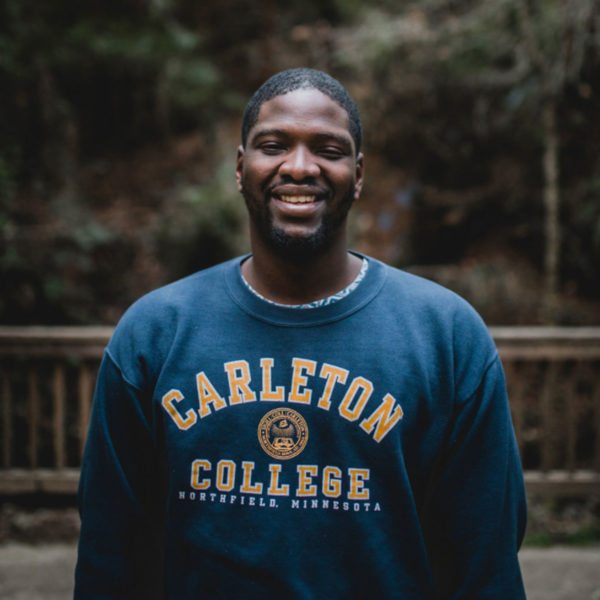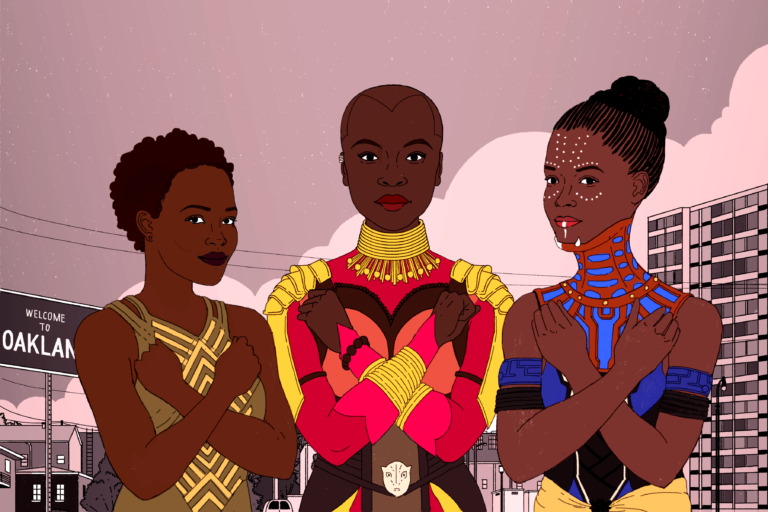The Inner Conflict of Watching Black Panther as an African and African American
Black Panther is shattering records worldwide, and for good reason. The film has been transformative for black viewers like myself across the globe, providing a glimpse of a world in which black people have both the autonomy and power to control their own destinies. Black Panther was the first blockbuster film I’ve seen in which blackness doesn’t operate as a sidekick or a token, but rather exists and strives in its own world: Wakanda, a hidden, technologically advanced country in the south plains of Africa. Leaving the theater after my first viewing of the film, I felt empowered. But something felt off to me: There was no proper resolution to the inner conflict of the film.
The film features Chadwick Boseman as T’Challa, the newly crowned Black Panther and king of Wakanda. New to the throne, T’Challa is tasked with making amends for the mistakes of his late father, King T’Chaka. During his reign, T’Chaka hunted down and murdered his younger brother, N’Jobu, in California. N’Jobu had fled Wakanda years earlier in search of a higher purpose outside of the peaceful dwellings of his native country. He settled down in Oakland and witnessed, firsthand, how his black American brothers were suffering from poor living conditions, drug abuse, unjust incarceration, and limited access to social mobility.
N’Jobu, angered by the mistreatment of his people, strategized to free his African-American kin from their oppression by insurrecting a civil war against the powers that constricted them: white privilege and systemic racism. Viewing his actions as treacherous and potentially dangerous for Wakanda, King T’Chaka took it upon himself to eliminate N’Jobu. Consequently, King T’Chaka created a far greater threat to Wakanda: N’Jobu’s son, N’Jadaka. Fatherless and abandoned by his uncle as young boy, N’Jadaka grows up to become Erik Killmonger (played by Michael B. Jordan), a spiteful mercenary, hell-bent on carrying out his father’s mission on a world scale.
Superhero films are often dismissed for lacking the profundity to answer our deepest questions and fears, but Black Panther isn’t your ordinary film; it is my lived experience. Unlike most superhero movies, the protagonist and antagonist of Black Panther, T’Challa and Killmonger, represent something larger than the stereotypical hero and villain tropes: They are reflections of the black identity.
I was born in 1994 in central Africa, in the capital city of Nigeria’s neighbor to the east, Cameroon. When I was five, my mom and I moved to Minneapolis with hopes of leading a better life than the one we had left behind. My upbringing in the Twin Cities was filled with confusion and frustration about my identity. I never felt as African as my mom, who had spent the majority of her life in Cameroon, but similarly I recognized that my African ties made me a little different from the majority of the black children in my neighborhood. I was becoming more American, but thanks to my mom’s insistence that I speak French and learn Cameroonian history, my African roots were deeply sown.
Twenty-three years young — it’s only recently that I’ve started to make peace with both my African and my African-American identity. So when I saw Black Panther and observed the juxtaposition of T’Challa and Killmonger, a civil war erupted inside of me anew. T’Challa’s kingdom, Wakanda, is a vision of an afro-futurist nation in Africa, where colonization and slavery never took place. Killmonger, on the other hand, literally wears cuts across his body, representing not only the numerous people he has murdered in his lust for power, but also the trauma of slavery and colonization.
Personally, T’Challa and Killmonger were symbols of home. From my African perspective, Black Panther was everything I ever wanted from a blockbuster film: strong African characters with whom I could relate. I saw glimpses of myself in T’Challa and Wakanda. I took pride watching him defend his throne on “Challenge Day,” the ceremony in which the Black Panther-elect must brawl and defeat all challengers to the throne. I, too, celebrated with the nation of Wakanda during his coronation as the new king and protector of Wakanda.
Witnessing T’Challa’s interactions with the women in his life — Ramonda, his mother, the Queen; Shuri, his sister and the country’s lead scientist; Nakia, a Wakandan spy and his romantic interest; and Okoye, the leader of Wakanda’s all-women army — I saw even more of myself in his character. I, too, grew up with an entourage of women who had a major impact on the way that I viewed and engaged with the world. The women in T’Challa’s circle morphed him into the progressive leader that African countries, often mired with corrupt politicians, dream of. His combination of humility and willingness to correct the mistakes of previous Wakandan leaders, namely those of his father, gave me a sense of hope for African countries — like my birth nation of Cameroon — that have experienced dictatorship for countless years.
Watching the film from my African-American perspective, however, the hope I gained from Wakanda was squandered. I questioned whether Wakanda would accept African Americans and other blacks into their black nirvana. Killmonger’s presence, though villainous, illustrated to me that Wakanda isn’t welcoming to all black people, even to those with Wakandan ties. No matter how much I wanted to dislike him, because that’s what we’re trained to do with villains — ignore the systems that broke them — I couldn’t hate Killmonger. He is sinister, yes, but there is a method to his madness. He is the extremist representation of African Americans and black people across the world that have been disenfranchised by societies that reject them and whose policies set up barriers to stop them from gaining status.
Like his father, N’Jobu, Killmonger wants an end to black suffering worldwide and believes that the only way to attain freedom is to overturn the world’s current governing system. He figures he can achieve this by gaining control of Wakanda’s advanced technology and national treasure, a special metal called vibranium. Shortly after his arrival in Wakanda, Killmonger defeats T’Challa for the throne and is granted the power of the Black Panther. With the superhuman power of the Black Panther in his clutches, a nation forced to back him, and the world’s most sophisticated weapons at his disposal, Killmonger is moments away from throwing the world into frenzy.
I am not in support of Killmonger’s militaristic approach to black liberation, but I empathize with his character. Killmonger was my younger self, new to the U.S., who didn’t understand why being black was seen as sinful or threatening. Killmonger was my college-educated self, who has been in the U.S. for over a decade now, who learned that African societies sold their kin for wealth. The same self who was also taught the depressing fate that these people, my people, suffered yesterday, and continue to suffer today. Killmonger is me today, trying to make sense of being black in the world.
I was angry when King T’Chaka was unwilling to listen to the testaments that his brother, N’Jobu, preached about the sufferings of black people outside of Wakanda. I was further angered when he refused to assist in their battle for freedom. I was disappointed when King T’Chaka didn’t bring younger Killmonger back to Wakanda with him. The scene where Killmonger meets Wakanda’s elders and the royal family and says, “Hi, Aunty,” caused theaters to roar in laughter, but for me it reflected my double consciousness confronting one another. It reminded me of my African family often telling me not to emulate African-American behaviors — to reject them altogether. My entire life I didn’t agree with them, and seeing this juxtaposition on screen made me uneasy. I remained unsettled for the remainder of the film.
As I exited the theater, I was excited for the impact that Black Panther would have on young black boys and girls that had the opportunity to watch the movie. Like most fans, I was stoked to hear that the Black Panther was going to be featured in the next Avengers movie. Excitement notwithstanding, I returned home to reconcile the unresolved drama of the film: Killmonger’s call for systemic change. T’Challa’s solution to this issue was to set up STEM programs that would help disenfranchised black communities. While STEM education would surely help many black children strive, it cannot and will not deter racism from impacting whether or not they are able to use, or even have the opportunity to validate their skills. The Black Panther is a symbol of black excellence and hope, but as both an African and African American, I returned home dreaming of the day that Wakanda would welcome home all of its lost Black children.


Share your reflection